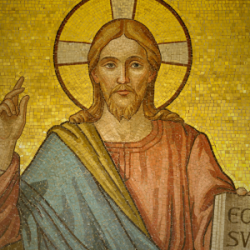Welcome readers! Please subscribe through the buttons on the right if you enjoy this post.

In the gospels, we read this characterization of Jesus’ work:
“But understand this: If the owner of the house had known at what time of night the thief was coming, he would have kept watch and would not have let his house be broken into. So you also must be ready, because the Son of Man will come at an hour when you do not expect him.” (Matthew 24:43-44, cf. Luke 12:39-40)
Not The Second Coming, But The First
Typically when this saying is used in most Christian preaching today, Jesus’ words are interpreted as a prediction of his return to Earth at the end of time. Remember, though, Jesus’ disciples didn’t yet even understand that he was going to be taken from them, much less that he would come back at some point in the future. At this stage of the story, Jesus would have still been speaking about his unexpected emergence among the people, not about some point in the distant future.
What difference does it make to apply this saying first to Jesus’ emergence among the poor in the 1st Century, before we jump to the Christian second coming? Let’s first allow this saying to relate to the appearing of the Jewish Jesus of Nazareth two thousand years ago and see if there is any message in that for us today. We can get to secondary interpretations later.
Jesus the Thief
In our society, the haves are assumed to be the “good guys.” Law and order protect the haves from the have-nots who step outside the lines the haves set down for them. In this week’s saying, Jesus subversively calls himself a thief whom householders need protection from. He calls himself a bad guy.
Morality is defined quite differently by those at the bottom and edges of society and those who are at the top and the center. Last month’s book of the month at RHM was James Cone’s God of the Oppressed. He describes how morality functioned for black slaves in America:
“The grounding of Christian ethics in the oppressed community means that the oppressor cannot decide what is Christian behavior. Intuitively and experientially black slaves recognized this basic truth because their mental and physical survival was at stake. They rejected the white masters’ view of morality, but they did not reject law and morality. Rather, they formulated a new law and a new morality that was consistent with black strivings for freedom . . . Thus black slaves made a distinction between ‘stealing’ and ‘taking.’ Stealing meant taking from a fellow slave, and ethics did not condone that. But to take from white folks was not wrong, because they were merely appropriating what was in fact rightfully theirs.” (pp. 191-192)
Cones uses illustrations from Olmsted and a slave named Charles that are well worth your consideration.
Consider also, how the legendary Robin Hood was viewed by the rich and how he was viewed by the exploited poor. Similarly, the “thief” Jesus in Luke preached good news to the poor (Luke 4:18, 6:30) and pronounced woes and curses on the rich (Luke 6:24).
This was in keeping with the Jewish prophetic tradition:
“For he will rescue the needy from their rich oppressors, the distressed who have no protector. He will have pity on the poor and the needy, and deliver the needy from death; he will liberate them from oppression and violence and their blood will be of high value in his eyes.” (Psalm 72:12)
Jesus’ definition of wealth as the exploitation of the poor and his call for wealth redistribution was viewed as thievery in his day. It’s still viewed as theft by many wealthy people today. I wish I had a dime for every time a well-meaning, affluent Christian responded to presentations where I talk about the wealth redistribution Jesus commanded by calling it “stealing” from them and giving to those less deserving.
Test this out yourself: take Luke 6:20 and 6:24 (Blessed are you are poor and woe to you who are rich), post it on Facebook, and see how long it takes for Evangelical Christians to chime in to qualify or condition the text. They won’t be able to let the texts sit there unexplained. They have a desperate need to qualify or censor these sayings of Jesus. And these are Christians, not the secular or nonreligious.
Jesus came preaching a new social order, a great reversal, or as Eliza Gylkison refers to it, The Great Correction. He invited those who had a lot to live in solidarity with those who had little, and he taught them to redistribute their wealth. It’s this idea of redistributing wealth to those who have less that was perceived as thievery.
Yet here is my point. Redistribution of wealth was good news to the poor in Jesus’s day and viewed as “stealing” by the rich. Not much has changed, today.
Those who are benefited and whose lives are bettered by domination systems (the haves) don’t view such an end as good news. Those on the underside of those systems, though, do see it as good news.
In the gospels, these systems are replaced by a table where resources are shared wealth is redistributed, and justice is distributive justice: everyone has enough and no one has too much. This is a new humanity where people are prioritized over profit, property, possessions, power, and privilege.
Today, many both here and abroad have suffered and are suffering for the sake of the “American Dream.” America is one of the wealthiest and most powerful nations in the world. And yet for such wealth and power, there are still 43 million people here who live below the poverty line. The wealth disparities in the American population are vast.
Today, “law and order” is the code phrase for a systemically unjust legal system that targets people of color, men especially, and takes their lives even when they have done nothing wrong. One example that top U.S. advisors to past administrations have admitted is that the “war on drugs” itself was created to target certain populations. People are targeted and arrested for nothing more than the color of their skin. That is “stealing.”
When one adds to this unjust system the capitalization of the prison industry and the free labor that benefits large corporations from an exploited prison population, one begins to see that slavery really never ended in the U.S. It simply took another form. (To learn more, read The New Jim Crow: Mass Incarceration in the Age of Colorblindness by Michelle Alexander.)
We find ourselves in an exploitative system today that takes from those forced to the underside of society and benefits those for whom the rules are shaped. To talk about reversing that nature of things provokes the accusation of “taking from the rich to give to the poor,” or thievery. For example, socialism (a workers’ movement) is accused of being thievery and capitalism is not. Even democratic forms of socialism are continually erased from the conversation by the haves in our society. Jesus envisioned a system where the strong take care of the weak, not a world where the strong prey on the weak. But, as he said, whenever the son of man appears in every generation, he is seen by the “householders” of the present system as a thief breaking in to “take away their possessions.”
Expectations
We have already traced the title son of man used in the gospels for Jesus back to the Jewish apocalyptic book of Daniel, specifically chapter 7. In this chapter, one like the “son of man” is given a kingdom, a new social order, that ends exploitative systems of domination, subjugation, and violence. The overthrow is violent, and it could be argued that the systems overthrown in this chapter are simply replaced by another subjugating domination system (see Daniel 7:14). This would make perfect sense given the historical context of those who wrote the book of Daniel. Violent overthrow was the only way they could imagine their subjugation by violent empires coming to an end.
In Jesus’ own society, there were also those who could not imagine arriving at a different world in any other way than through violent uprising. But Jesus invited us into the end of domination, subjugation, and exploitative systems not through more domination, but in a way that was deeply unexpected. “Sell your possessions and give to the poor,” he taught (Luke 7:33). This was good news to the poor, and it was thievery to the “householders” within that society. It was counter-intuitive, beyond what they had imagined.
I imagine that many who heard Jesus could not connect the dots between following his plan and bringing about a world without domination, subjugation, and exploitation. Jesus invited them into a relationship with one another, into a community where they choose to take care of one another. In that community, those who had a lot gave to take care of those whose needs were not being met. As it states in Acts, “all the believers were together and had everything in common. They sold property and possessions to give to anyone who had need” (Acts 2:44-45).
In the 1st Century, Jesus was inviting his listeners into a new human society, a beloved community, that the wealthy elites indicted as theft. He was calling the people to voluntarily enter into a community that he felt could avoid the Gehenna that they were heading toward. If they chose the relationship, they could avoid the uprising of the exploited, the war against Rome, and the utter destruction of Jerusalem that history now tells us was only three decades ahead of them at that time. The result of ignoring Jesus’ call to wealth redistribution and reparations for past exploitations came in 66-70 C.E. when the exploited poor in Judea rose up, drove out the wealthy from the Temple, and proceeded to take up arms against Rome itself, too. Rome put down what began as a poor people’s rebellion in a way that left nothing for anyone. It was complete destruction for all.
Revolts and revolutions don’t always come. Oppressed communities don’t always rise up. They sometimes just give up. And there aren’t always third parties such as “Rome” that come in and wipe out everyone. I still wonder what lies ahead for us that we could avoid with the choices we are making today.
What lies on our horizon?
What will be the result of our environmental abuses driven by greed?
What will be the result of our military-backed, economic exploitation of countries abroad?
What will be the result of our exploitation of the lower and middle classes here in the U.S.?
What will be the result of our refusal to make reparations for our deeply racist past?
What will be the result of our racist “law and order” and unjust criminal justice system?
What will be the result of our classism, racism, sexism, cis-heterosexism, militarism, and corporatism?
If Jesus walked U.S. streets today, what would he see on America’s horizon?
Who would he be calling us into relationship, community, and solidarity with?
What redistribution of wealth and power in favor of those on the undersides and edges of our society would he be calling us to voluntarily embrace?
Even if one only considers the environmental impact, it will be much less catastrophic to embrace our interconnectedness today, and enter into community with the people we share this planet with and with whom we also call Earth “home.”
We are in this together.
We are each others’ fate.
The choice is ours.













